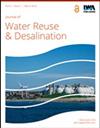Effects of mixed irrigation using brackish water with different salinities and reclaimed water on a soil-crop system
IF 2.3
Q2 Environmental Science
引用次数: 5
Abstract
To explore the effects of mixed irrigation on soil and crops, a pot experiment was conducted in two salinity levels of brackish water, four levels of mixed brackish-reclaimed water and freshwater irrigation as the control. The soil Na-Cl to Ca-SO4 contents changed, and activities of soil alkaline phosphatase and polyphenol oxidase changed, exhibiting a ‘V’-shaped curve with increasing the proportion of reclaimed water in the mixture. At the same brackish-reclaimed water level, there were no significant differences in alkaline phosphatase and polyphenol oxidase activities except for soil alkaline phosphatase activity decreasing significantly with the increase in salinity under brackish water irrigation. Mixed irrigation obviously improved superoxide dismutase activity but no significant influences on aboveground dry weight, underground biomass or crop physiological indexes (chlorophyll, soluble protein, malondialdehyde, peroxidase, catalase). Based on the integrated biological response index version 2 (IBRv2), the deviation of reclaimed water irrigation was the smallest, followed by 1:1 and 1:2 (3, 5 g/L brackish water salinities, respectively), with IBRv2 values of 7.94, 12.55 and 16.04. Therefore, considering the soil-crop characteristics, limited daily water amount and inadequate pipeline facilities for reclaimed water, the brackish-reclaimed water ratio should be 1:1 and 1:2 at 3, 5 g/L of brackish water, respectively.不同盐度微咸水与再生水混合灌溉对土壤-作物系统的影响
为了探讨混合灌溉对土壤和作物的影响,在两个盐度水平的微咸水、四个盐度水平混合微咸水再生水和淡水灌溉作为对照进行了盆栽试验。土壤Na-Cl-Ca-SO4含量发生变化,土壤碱性磷酸酶和多酚氧化酶活性发生变化,随中水比例的增加呈“V”型曲线。在相同的微咸水灌溉水平下,除土壤碱性磷酸酶活性随盐度的增加而显著降低外,碱性磷酸酶和多酚氧化酶活性没有显著差异。混灌能明显提高超氧化物歧化酶活性,但对地上干重、地下生物量或作物生理指标(叶绿素、可溶性蛋白、丙二醛、过氧化物酶、过氧化氢酶)无显著影响。根据综合生物反应指数版本2(IBRv2),再生水灌溉的偏差最小,其次是1:1和1:2(分别为3、5g/L微咸水盐度),IBRv2值分别为7.94、12.55和16.04。因此,考虑到土壤作物特性、日水量有限和再生水管道设施不足,在3、5g/L的微咸水条件下,微咸水再生水比例应分别为1:1和1:2。
本文章由计算机程序翻译,如有差异,请以英文原文为准。
求助全文
约1分钟内获得全文
求助全文
来源期刊

Journal of Water Reuse and Desalination
ENGINEERING, ENVIRONMENTAL-WATER RESOURCES
CiteScore
4.30
自引率
0.00%
发文量
23
审稿时长
16 weeks
期刊介绍:
Journal of Water Reuse and Desalination publishes refereed review articles, theoretical and experimental research papers, new findings and issues of unplanned and planned reuse. The journal welcomes contributions from developing and developed countries.
 求助内容:
求助内容: 应助结果提醒方式:
应助结果提醒方式:


